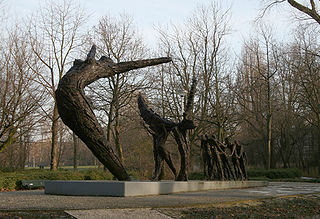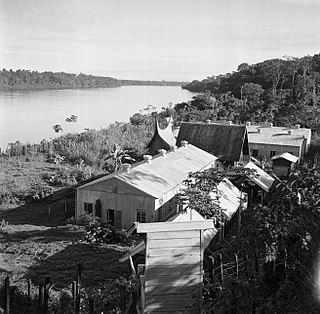Related Research Articles

The Danish West Indies or Danish Antilles or Danish Virgin Islands were a Danish colony in the Caribbean, consisting of the islands of Saint Thomas with 32 square miles (83 km2); Saint John with 19 square miles (49 km2); and Saint Croix with 84 square miles (220 km2). The islands have belonged to the United States since they were purchased in 1917. Water Island was part of the Danish West Indies until 1905, when the Danish state sold it to the East Asiatic Company, a private shipping company.
The early history of Suriname dates from 3000 BCE when Native Americans first inhabited the area. The Dutch acquired Suriname from the English, and European settlement in any numbers dates from the 17th century, when it was a plantation colony utilizing slavery for sugar cultivation. With abolition in the late 19th century, planters sought labor from China, Madeira, India, and Indonesia, which was also colonized by the Dutch. Dutch is Suriname's official language. Owing to its diverse population, it has also developed a creole language, Sranan Tongo.
The Navigation Acts, or more broadly the Acts of Trade and Navigation, were a long series of English laws that developed, promoted, and regulated English ships, shipping, trade, and commerce between other countries and with its own colonies. The laws also regulated England's fisheries and restricted foreigners' participation in its colonial trade. While based on earlier precedents, they were first enacted in 1651 under the Commonwealth.

Indentured servitude is a form of labor in which a person is contracted to work without salary for a specific number of years. The contract, called an "indenture", may be entered "voluntarily" for purported eventual compensation or debt repayment, or it may be imposed "involuntarily" as a judicial punishment. Historically, it has been used to pay for apprenticeships, typically when an apprentice agreed to work for free for a master tradesman to learn a trade. Later it was also used as a way for a person to pay the cost of transportation to colonies in the Americas.

Coolie is a pejorative term used for low-wage labourers, typically of Indian or Chinese descent.
Indo-Caribbean or Indian-Caribbean people are Indian people in the Caribbean who are descendants of the Jahaji Indian indentured laborers brought by the British, Dutch, and French during the colonial era from the mid-19th century to the early 20th century. A minority are descendants of Indians or other South Asians who immigrated as entrepreneurs, businesspeople, merchants, engineers, doctors, and other professional occupations beginning in the mid-20th century.
The Indian indenture system was a system of indentured servitude, by which more than 1.6 million Indians were transported to labour in European colonies, as a substitute for slave labor, following the abolition of the trade in the early 19th century. The system expanded after the abolition of slavery in the British Empire in 1833, in the French colonies in 1848, and in the Dutch Empire in 1863. British Indian indentureship lasted till the 1920s. This resulted in the development of a large Indian diaspora in the Caribbean, Natal, East Africa, Réunion, Mauritius, Sri Lanka, Malaysia, Myanmar, to Fiji, as well as the growth of Indo-Caribbean, Indo-African, Indo-Fijian, Indo-Malaysian, and Indo-Singaporean populations.

John Casor, a servant in Northampton County in the Virginia Colony, in 1655 became the first person of African descent and second person in the Thirteen Colonies to be declared as a slave for life as a result of a civil suit. In 1662, the Virginia Colony passed a law incorporating the principle of partus sequitur ventrem, ruling that children of enslaved mothers would be born into slavery, regardless of their father's race or status. This was in contradiction to English common law for English subjects, which based a child's status on that of the father. In 1699 the Virginia House of Burgesses passed a law deporting all free black people. But many new families of free black people continued to be formed during the colonial years by the close relationships among the working class.

In common with most Caribbean countries, slavery in the British Virgin Islands forms a major part of the history of the Territory. One commentator has gone so far as to say: "One of the most important aspects of the History of the British Virgin Islands is slavery."

A slave insurrection started on Sankt Jan in the Danish West Indies on November 23, 1733, when 150 African slaves from Akwamu, in present-day Ghana, revolted against the owners and managers of the island's plantations. Led by Breffu, an enslaved woman from Ghana, and lasting several months into August 1734, the slave rebellion was one of the earliest and longest slave revolts in the Americas. The Akwamu slaves captured the fort in Coral Bay and took control of most of the island. They intended to resume crop production under their own control.


Slavery in Virginia began with the capture and enslavement of Native Americans during the early days of the English Colony of Virginia and through the late eighteenth century. They primarily worked in tobacco fields. Africans were first brought to colonial Virginia in 1619, when 20 Africans from present-day Angola arrived in Virginia aboard the ship The White Lion.

The Code noir was a decree passed by King Louis XIV of France in 1685 defining the conditions of slavery in the French colonial empire. The decree restricted the activities of free people of color, mandated the conversion of all enslaved people throughout the empire to Catholicism, defined the punishments meted out to slaves, and ordered the expulsion of all Jews from France's colonies.

Surinam, also unofficially known as Dutch Guiana, was a Dutch plantation colony in the Guianas, bordered by the equally Dutch colony of Berbice to the west, and the French colony of Cayenne to the east. It later bordered British Guiana from 1831 to 1966.

Indentured servitude in British America was the prominent system of labor in the British American colonies until it was eventually supplanted by slavery. During its time, the system was so prominent that more than half of all immigrants to British colonies south of New England were white servants, and that nearly half of total white immigration to the Thirteen Colonies came under indenture. By the beginning of the American Revolutionary War in 1775, only 2 to 3 percent of the colonial labor force was composed of indentured servants.

Jacob Theodoor Cremer was a tobacco magnate and administrator for the Deli Company in Sumatra. He was from the Netherlands. He also became a politician and was a member of the Lower House. From 1897 – 1901 he was Minister of Colonies. He was President Dutch Trading Company, Amsterdam (1907–1912).

Surinam, also known as Willoughbyland, was a short-lived early English colony in South America in what is now Suriname. It was founded in 1650 by Lord Willoughby when he was the Royalist Governor of Barbados.
The Indian community in the United States Virgin Islands is made up of Indo-Caribbeans, Indian Americans and other persons of Indian origin. The first Indians in the United States Virgin Islands (USVI) arrived in the Danish colony of Saint Croix in June 1863 as indentured workers. However, the nearly all 325 Indians who came to Saint Croix left the island by the 1870s. Nearly two-thirds returned to India, while the others emigrated to Trinidad and Tobago. Some settled in that country, while others returned to India from Trinidad.

The history of Dutch slavery involves slavery in the Netherlands itself, as well as the establishment of slavery outside the Netherlands in which it played a role. The Netherlands banned the slave trade in 1814 after being compelled by Britain.

Jodensavanne was a Dutch internment camp for political prisoners from the Dutch East Indies operated in Surinam during World War II. The camp was named after a nearby, long-abandoned Jewish colony, Jodensavanne.
References
- Prof. dr. J.C. Breman: Koelies, Planters en Koloniale Politiek, Dordrecht 1987: Foris